Photographs: Rajesh Karkera/Rediff.com Sreelatha Menon in New Delhi
What a difference two years can make.
In 2009, the Unique Identification Project spearheaded by the government's then golden boy, Nandan Nilekani, was a much publicised and pampered one.
Today, it has become everybody's favourite whipping boy.
The project chief aim was simple: to disseminate unique identification numbers to every resident of the country, chiefly benefiting those with no identity such as the poor and migrants who find it difficult to get access basic entitlements like a ration card, a phone connection or a bank account.
. . .
Nilekani's UID under siege
Image: A woman shows her voter identity card as she waits for her turn to cast her ballot at a polling station in Bikaner.Photographs: Vinay Joshi/Reuters
The Cabinet Committee on Unique Identification Authority of India, after allowing the authority to collect data for 10 crore (100 million) people in 2010, never took up the matter again, while the Finance Ministry decided later to increase this number to 20 crore (200 million).
Things came to a head when the UIDAI came up with a proposal before the Finance Ministry last month seeking about Rs 14,841 crore (Rs 148.41 billion) for collecting data and issuing numbers to the entire population.
The Home Ministry was the first to cast a stone at the UIDAI proposal saying that it did not find the data collected by it reliable and that it would have to collect its own data for the National Population Register, which was to provide identity cards to people in coastal areas for security purposes.
. . .
Nilekani's UID under siege
Image: A voter registers his vote using his fingerprint.Photographs: Pawel Kopczynski/Reuters
This meant duplication of work, and cost.
What is embarrassing for the UIDAI, is that the data it has so far collected for 8.5 crore (85 million) people stands the possibility of being rejected by the National Population Registry whose officials say that they may collect data for these people all over again.
"We can collect the data for the whole country by 2014 and at half the cost," says a top official of the NPR.
And we collect the data from a person in his residence, and hence ours is reliable while the collection points for UIDAI are ad hoc, and through introducers. We cannot use this at all,'' says the official.
. . .
Nilekani's UID under siege
Image: A labourer displays her job card, given under the NREGA, plan at Korhar village near Patna.Photographs: Reuters
UIDAI director general R S Sharma says that if data on 20 crore (200 million) people collected till March 2012 is rejected it would be a loss of Rs 1,000 crore (Rs 10 billion).
Sharma is at a loss to explain why the NPR can't trust UID's data since it is after all one of the registrars partnering with UIDAI in data collection.
"The other registrars collecting data are state governments, the same ones who help the Census,'' says Sharma.
Meanwhile the Home Ministry has called a conference of chief secretaries this week to emphasise the importance of collecting data through the NPR, which now seems to be competing with the other registrars appointed by UIDAI.
. . .
Nilekani's UID under siege
Image: Microsoft Corp co-founder Bill Gates speaks with Nandan Nilekani.Photographs: B Mathur/Reuters
UIDAI pays Rs 50 per person for collection of data to the state, while the Census pays nothing and consequently the states have been giving more attention to the UIDAI work than to the NPR much to the annoyance of the latter.
The Home Ministry also has knives out for UIDAI due to what it feels are unnecessary expenses especially with respect to iris scanning.
The ministry points out that the Cabinet had given only an 'in principle' approval to iris scanning and that it has a 'huge cost implication'.
. . .
Nilekani's UID under siege
Image: Nandan Nilekani.Photographs: Jagadeesh Nv/Reuters
The total cost on NPR and National Identity cards (a new project of the Home Ministry) would be Rs 13,438 crore (Rs 134.38 billion).
The cost of UIDAI-Aadhar is projected at Rs 17,864 crore (Rs 178.64 billion).
"Thus an investment of Rs 31,302 crore (Rs 313.02 billion) would have to be made if NPR and UIDAI are implemented in parallel." it says.
It further says that the convergence of UIDAI and NPR and exclusion of iris. . . would reduce the cost by over Rs 15,000 crore (Rs 150 billion).
Sharma disagrees: "The iris scanner costs just Rs 23,000 while it used to cost Rs 100,000 earlier.
. . .
Nilekani's UID under siege
Image: New born babies rest inside a ward at a hospital in Lucknow.Photographs: Pawan Kumar/Reuters
A single scan costs Rs 4.40 and for the whole country it would cost just Rs 500 crore (Rs 5 billion).
This is nothing compared to the Rs 6000 crore (Rs 60 billion) the Planning Commission is talking of", he says.
Sharma also argues that having multiple modes of identification is always better than a single one and prevents faking of identities.
The third accusation is levied by the Planning Commission, its parent body, which states that the expenses of the UIDAI are not routed through it and hence needs a separate financial advis#8744 preferably its own; to monitor UIDA, says Sharma.
. . .
Nilekani's UID under siege
Image: The Parliament House.The Commission by imposing its financial advisor on the UIDAI would be reversing its own notification which had earlier allowed the UIDAI financial advisor to send proposals directly to the Finance Secretary like all ministries do.
The last nail in the coffin seems to be the seemingly absurd declaration by the Reserve Bank of India this week that having a UID would not be enough to open a bank account and that an address proof would still be needed.
. . .
Nilekani's UID under siege
Image: The Surya-Kiran aerobatic team of the Indian Air Force flies past the Indian flag.Photographs: Jagadeesh Nv/Reuters
Of course, all of this could have been easily avoided if the government passed legislation making UIDAI a statutory authority, which would have laid out its mandate in clear terms, vis a vis the role of all other institutions and ministries.
Its absence has bred rampant confusion and speculation.
. . .
Nilekani's UID under siege
Nilekani addressed the media on Thursday and said that the plan had the backing of the government.
"The Planning Commission Deputy Chairman Montek Singh Ahluwalia will clear the air once he returns from abroad but the UIDAI is on schedule to meeting its goals," he added.
Lets hope that for the sake of millions of Indians who have trouble proving their existence that he is right.


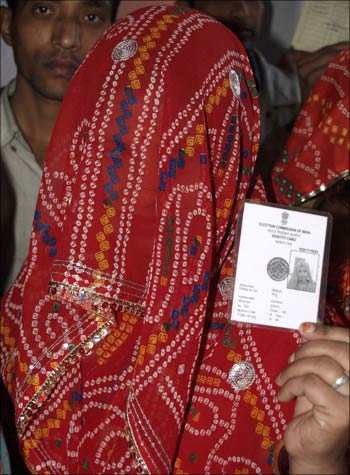

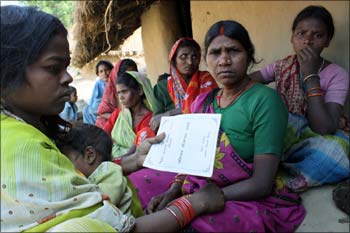
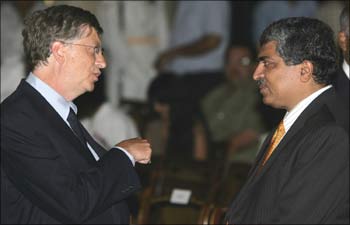


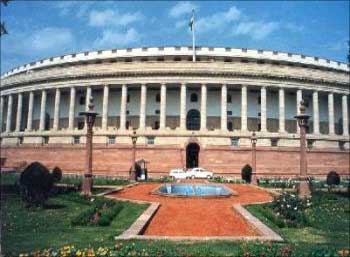
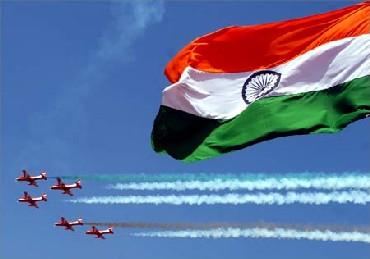
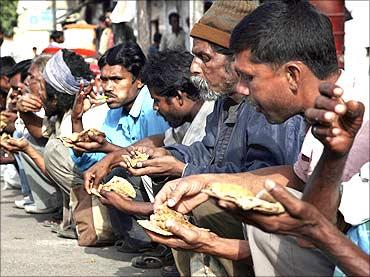

article